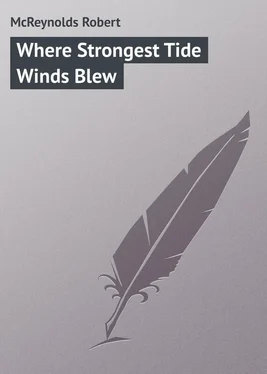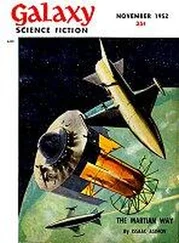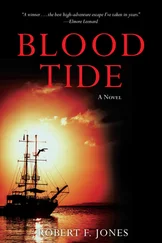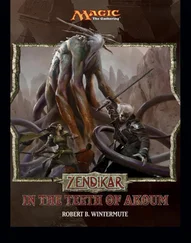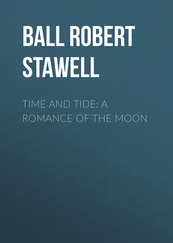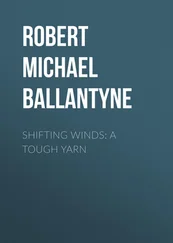Robert McReynolds - Where Strongest Tide Winds Blew
Здесь есть возможность читать онлайн «Robert McReynolds - Where Strongest Tide Winds Blew» — ознакомительный отрывок электронной книги совершенно бесплатно, а после прочтения отрывка купить полную версию. В некоторых случаях можно слушать аудио, скачать через торрент в формате fb2 и присутствует краткое содержание. Жанр: Прочие приключения, foreign_prose, на английском языке. Описание произведения, (предисловие) а так же отзывы посетителей доступны на портале библиотеки ЛибКат.
- Название:Where Strongest Tide Winds Blew
- Автор:
- Жанр:
- Год:неизвестен
- ISBN:нет данных
- Рейтинг книги:4 / 5. Голосов: 1
-
Избранное:Добавить в избранное
- Отзывы:
-
Ваша оценка:
- 80
- 1
- 2
- 3
- 4
- 5
Where Strongest Tide Winds Blew: краткое содержание, описание и аннотация
Предлагаем к чтению аннотацию, описание, краткое содержание или предисловие (зависит от того, что написал сам автор книги «Where Strongest Tide Winds Blew»). Если вы не нашли необходимую информацию о книге — напишите в комментариях, мы постараемся отыскать её.
Where Strongest Tide Winds Blew — читать онлайн ознакомительный отрывок
Ниже представлен текст книги, разбитый по страницам. Система сохранения места последней прочитанной страницы, позволяет с удобством читать онлайн бесплатно книгу «Where Strongest Tide Winds Blew», без необходимости каждый раз заново искать на чём Вы остановились. Поставьте закладку, и сможете в любой момент перейти на страницу, на которой закончили чтение.
Интервал:
Закладка:
I was at his side in a moment, and saw that he was delirious. The exertion through the snow the day before, the loss of sleep and intense anger, had made him ill. I knew of a few simple remedies at hand, and in a little while I had him sleeping soundly.
The sun became warmer as the day advanced. The snow melted on the cabin roof and froze in drooping icicles at the eaves. All day I went noiselessly about the cabin, letting Buchan sleep. A premonition of impending danger crept over me. I tried to throw off the dread feeling by reading, but I could not concentrate my thoughts on the pages of the book. Strange thoughts came like they did to the man who was being taken to the guillotine and begged time of his captors to put his thoughts on paper. I thought I would write mine that day, or remember them at least, but I cannot recall them. I only know they were strange and fascinating, as if I was living another life, on another planet.
I brought in wood and water for the night. The sound of the door slamming awoke Buchan. He arose and sat by the fire, which blazed up brightly from its fresh supply of pine logs.
“Better, I see,” I observed, “but heavens you were locoed this morning! talking about the resurrection, the quaking earth, and the dead rolling out from their graves!”
“All true,” he said, quietly. “I have seen those things, and what has happened once may happen again.”
I was standing by the window, looking out over the snow covered San Luis valley, when even as he spoke I felt the ground tremble. There was a rush of air and the cabin became filled with a fine snow that was stifling, then a thunderous roar, and all was utter darkness.
I was choking with the snow particles. I groped to the door and opened it and felt a solid bank of snow.
I realized then that we were buried beneath a snow slide.
We worked for hours, in silence and darkness, digging our way through the snow and shoveling it back into the cabin as we tunneled toward the cliff. It was early morning when we saw the light of day.
Once in the open where we could breathe the pure air we beheld a sight that would appall the strongest heart. The great flat rock, that had stood on edge at the back of the cabin, was now slanting at a sharp angle above our heads. The avalanche from near the summit of the Sangre de Christo had struck the cliff and with its incalculable tons tilted it, piling itself hundreds of feet in the depth about us. The cliff might fall at any moment and blot us out of existence.
Reaching a point of sight near the open space at the edge of the base of the cliff we could see something of the awful havoc wrought by the avalanche. Huge rocks had been loosened from their foundations and with the speed of a meteor dashed to the valley below. Great pines one hundred feet in height had been torn up by their roots and hurled down the mountain side by the tremendous weight of the avalanche.
The cliff had sheltered our cabin and saved our lives.
We cleared the snow away from the chimney and out of the cabin. Our wood was dry and we soon had a cheerful fire blazing and the tea kettle boiling. But living under that slanting cliff, from which we could not escape, we felt, indeed that the sword of Damocles hung by a spider web above our heads.
When we had rested some and refreshed ourselves with coffee, we tunneled from the open space under the cliff to near the entrance of the mine, intending to live in the tunnel until the melting snows of the spring released us from our prison. But when we had tunneled through the snow to near the entrance of the mine, we found our way blocked by a debris of rock and trees which would require weeks of labor to remove. Tunnels in other directions gave us no better results, and we became resigned to our fate, returning to the cabin to while away the dreary hours until the hanging cliff above should become our grave stone.
Days of gloom and monotony came and went. We dug the snow away from our windows and tunneled a hole to the top which gave us a glare of reflected light.
Buchan had hitherto been silent as to his past life. By a few stray remarks we had caught glimpses of his romantic career, but now he began relating in detail incidents of his early life in Scotland, or on the high seas, and later in Peru. His stories were so full of human interest and replete with love and romance, that I became more than ever interested in him. But my hearing was bad, and it had been getting worse since the day of the avalanche, so I prevailed upon him to write. I could read better than listen, besides he would write his better thoughts and nobler sentiments when he would not speak them.
It was writing these memoirs of his eventful life that furnished him pastime and I was employed in reading them, during the two months of our imprisonment in our snow bound cabin.
By the dim light of the window by day and the blaze of a pine log at night, he wrote upon the scraps of paper found about the cabin. As I now review the pile I find it made up of paper bags, margins of newspapers, fly leaves from a few old books, and much of it on strips of a yellow window shade, also on the backs of fancy calendars with which Carson had adorned our cabin, and almost a whole chapter I find penciled finely on a pair of lady’s cuffs that were strangely out of place in a miner’s hut.
Buchan does not know that I am going to give his story to the public and I shall have to take chances and risk his displeasure. In that event I have the defence of pleading that no man has the right to withhold so good a tale from the world.
II.
IN DAYS OF INNOCENCE
As I peer into the dim past that haunts the scenes of my childhood in Aberdeen, Scotland, a thousand memories troop by like the scenes of a panorama with the footlights turned low; and when I contemplate them in a meditative hour it leaves me with as lonesome a feeling as if I had listened to the old time song, “Home Sweet Home,” which I have heard a thousand times in distant climes, sometimes sung to crowded audiences at the opera, and again by the pioneer as he rattled his prairie schooner over the plains.
It is a song that never grows old and never will so long as men leave the home of their childhood, around whose hearthstones still play ghost-like, the recollections of bye-gone years, tenderly touching their sympathies as they pause for a moment in their monied pursuits in other lands.
The old red school house on Princeton street, with the tall lank figure of Ellwood for its presiding master and who believed in and practiced the command of the Holy Writ: “Spare the rod and spoil the child,” was to me in those years of tenderness, a dismal contemplation. But Sundays had a brighter hue when Mother would dress me in full Highland suit of tartan, and adorn my cap with an eagle feather, surmounted with a brooch of the design of an arm with a dagger, bearing the motto, “We fear nae fae.” With my small claymore and buckled shoes and plaid, how proudly I would walk up to the barracks at Castle Gate, where the sentry would salute me, and give me permission to enter.
But those days had their troubles as well as pleasures. The West North street boys had a grievance against those of the East North street and one Saturday both sides met in battle array, armed with wooden swords, near the North church at Queen street. After a determined resistance West North street was victorious, when someone presented us with a flag. It was a common piece of bunting, but to our young heroes it was something to be looked up to and defended with our lives before the honor of West North street should be sullied.
That banner cost us many a headache, and many a soiled suit of clothes after the usual Saturday battle. On one occasion we sallied forth as usual to the battlefield, carrying our banner, and shouting derisively at our foe. The enemy had been reinforced and after a hard struggle, they captured our flag and carried it off in triumph to East North street.
Читать дальшеИнтервал:
Закладка:
Похожие книги на «Where Strongest Tide Winds Blew»
Представляем Вашему вниманию похожие книги на «Where Strongest Tide Winds Blew» списком для выбора. Мы отобрали схожую по названию и смыслу литературу в надежде предоставить читателям больше вариантов отыскать новые, интересные, ещё непрочитанные произведения.
Обсуждение, отзывы о книге «Where Strongest Tide Winds Blew» и просто собственные мнения читателей. Оставьте ваши комментарии, напишите, что Вы думаете о произведении, его смысле или главных героях. Укажите что конкретно понравилось, а что нет, и почему Вы так считаете.
